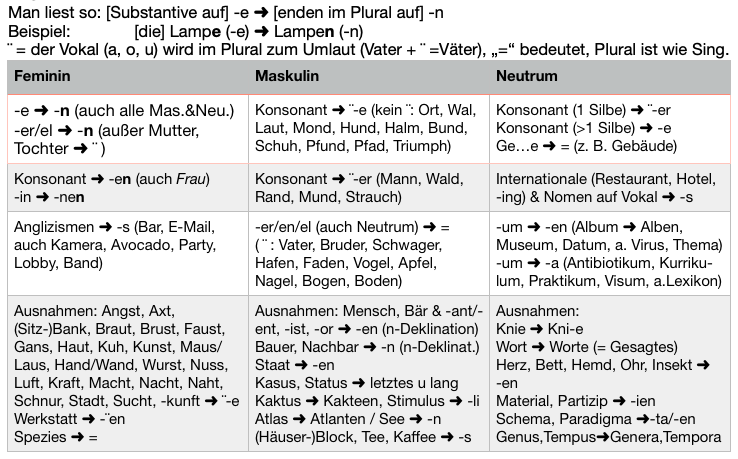Plural in German
How to Form the Plural in German

Plural in German. Forming the plural of German nouns is not as complicated as you may think. There are some important rules that I am going to explain in this post.
Plural depends on gender (the article)!
Like other languages that decline nouns, such as Greek or Polish, in German, too, this topic depends on the gender of a noun.
This is just another reason that shows why it is so important to learn the gender, i.e. the article, of the nouns.
1. Feminine nouns
Just as for the article rules, also the plural of the feminine gender is the easiest and most regular one. About 95% of the feminine nouns finish in –(e)n.
Depending on their endings, there are 4 variations but the important fact is all of them end in –n:
- All the nouns (including masculine and neutral ones!) finishing in -e just add -n: die Tasche → Taschen (der Junge → Jungen, das Auge → Augen).
- Feminine nouns ending in -er or -el also add just –n: Schwester → Schwestern, Mauer → Mauern, Tafel → Tafeln. The only exceptions are: Mutter → Mütter, Tochter → Töchter.
- Feminine nouns ending in consonant (including Frau) add –en: Universität → Universitäten, Kreuzung → Kreuzungen, Frau → Frauen.
- The most typical feminine (or gendered) nouns ending in –in (nationalities, professions, some feminine animals) add –nen (the –n– must be duplicated for phonetic reasons): Spanierin → Spanierinnen, Rezeptionistin → Rezeptionistinnen, Löwin → Löwinnen.
Exceptions from this regular feminine nouns are the following: Angst, Axt, (Sitz-)Bank, Braut, Brust, Faust, Gans, Haut, Kuh, Kunst, Maus/Laus, Hand/Wand, Wurst, Nuss, Luft, Kraft, Macht, Nacht, Naht, Schnur, Stadt, Sucht, Zu-/Ankunft. They add umlaut + –e: Kuh → Kühe, Hand → Hände, Maus → Mäuse, Ankunft → Ankünfte (being rather the “masculine plural”, see next).
German Plural Rules | Best Tips, Tricks and Hacks! | Plural Regeln
2. Masculine nouns
Very important: masculine and neutral nouns normally don’t end in -n in plural. Only in dative plural, they add an extra –n over their regular plural: der Stuhl → die Stühle (regular plural) → von den Stühlen (dative plural).
- a) The most typical ending of masculine nouns is umlaut (if they contain a, o, u) + –e: Schrank → Schränke, (Schreib-)Block → Blöcke, Tisch → Tische, Film → Filme, Freund → Freunde.
- b) But not all of them add umlaut dots. The following nouns add just –e in plural (these we have to learn): Ort, Wal, Laut, Mond, Hund, Halm, Schuh, Pfund, Pfad, Triumph (Ort → Orte, Hund → Hunde).
2. Nevertheless, there are also some masculine nouns that end in umlaut + –er (also these must be learned): Mann, Wald, Rand, Mund, Strauch (Mann → Männer, Rand → Ränder) (being rather the “neuter plural”, see next).
If the noun ends in -er/-en/-el, normally it adds nothing in plural (meaning the plural is invariable): der Spanier → die Spanier, der Lehrer → die Lehrer, der Rasen → die Rasen, der Deckel → die Deckel. 2 exceptions: der Charakter → die Charaktere (stressed vowel changes), der Muskel → Muskeln.
But there are some nouns that add umlaut dots (to be learned as well): Bruder, Vater, Schwager, Apfel, Nagel, Vogel, Boden, Bogen, Hafen, Faden (Bruder → Brüder, Hafen → Häfen, Bogen → Bögen).
Nouns ending in –or add –en: Motor → Motoren.
Exceptions from these rules are the nouns belonging to the so-called “n-declension”.
3. Neuter nouns
The most typical ending of neutrer nouns with 1 syllable is umlaut + –er: Buch → Bücher, Haus → Häuser, Glas → Gläser.
Neuter nouns with 2 or more syllables add just –e in plural: Telefon, Problem, Regal, Geschenk, Gespräch, nouns in -ier (Telefon → Telefone, Problem → Probleme, Papier → Papiere, Dokument → Dokumente). Exception: Gesicht → Gesichter.
Also these nouns add just –e: Bein, Boot/Schiff, Brot, Ding, Heft, Haar, Jahr, Kreuz, Netz, Stück, Salz, Spiel, Teil, Tier, Tor, Werk, Zelt, Ziel, -zeug
Exceptions: These nouns add –en: Bett, Hemd, Herz, Ohr, Verb
As to nouns from Latin ending in –um, there are 2 different plural forms, depending on how long they have been in the German language:
- Borrowed from Latin long time ago: they change –um to –en (Album → Alben, Museum, Datum; also Virus → Viren).
- Rather modern words: they maintain the Latin plural changing –um to –a (Antibiotikum → Antibiotika, Praktikum, Visum, Curriculum, also Lexikon → Lexika).
Something similar happens with nouns from Greek ending in –ma. Formerly, only the original Greek plural ending –ta was used but nowadays, in very common words, we use also a German plural (like Thema → Themen) or the English plural (like Komma → Kommas).
- Komma: die Kommas und Kommata
- Koma: die Komas und Komata
- Schema: die Schemas und Schemata, also Schemen
- Paradigma: die Paradigmen, also Paradigmata
4. Plural in -s
The plural in -s is not a typical German plural ending! Normally, the –s is used in genitive masculine and neutral (des Bruders, des Buch[e]s).
But there many borrowings from other languages (mostly English and French), i.e. international words that were taken together with their plural form.
- All the nouns ending in vowel (except for –e), including –y and –ee: Videos, Radios, Sofas, Kameras, Menüs, Taxis, Hobbys, Partys, Tees.
- International words ending in consonant (except for –er): Restaurants, Hotels, E-Mails, Trainings.
- Also referring to a whole family (= last) names: Oskar und Hanna Meier → die Meiers.
As to basic German nouns that can form the plural adding –s, this is a linguistic innovation and is considered slang: der Junge → die Jungs, das Mädchen/Mädel → die Mädels, der Onkel → die *Onkels.






























